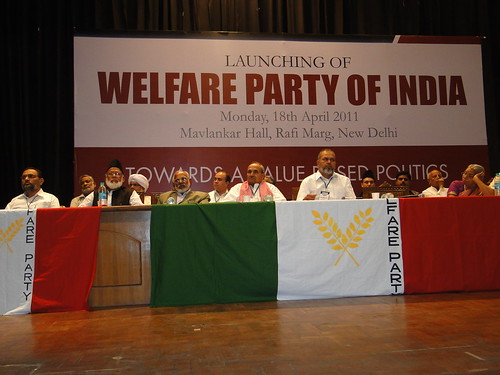By Dr Syed Muneeb Ahmed,
Launch of a new political party is not an item worthy of much news in India. Unless of course, it has an acclaimed film-star embarking upon his political aspirations, or a disgruntled political heavyweight parting ways from his old clan. The launch of Welfare Party of India (WPI) had neither. The glamour was absent so were the tried and tested faces of Indian politics. Hundreds of such ‘political wannabes’ take birth across the country and undergo political senescence even before the first vote is cast. Nothing worth mentioning, one might think. What then, made this innocuous bunch of people garner such hostility right at the outset?

Leaders of Welfare Party of India on the day of its launching on April 18. Mujtaba Farooque, 5th from left.
A political party floated by Jamaat e Islami Hind, that most maligned of Muslim organizations owing to its namesakes in neighbouring countries; what would be expected out of it? People’s imagination conjured up images of Shariah spewing mullahs baying for power. Caught up in this frenzy of imagination are some well-known names like Javed Anand and Seema Mustafa.
The visage has drowned out the sound, it would seem. As no one is interested in hearing what the Welfare Party of India has to say. That the Welfare Party of India aims at a welfare state based on moral values and governed by the principles of justice, freedom, equality and fraternity did not go down with the people. That the new political party would be a secular party with members drawn from different religions, regions and castes did not register in their minds.
Javed Anand went 70 years back in history to pick upon the founder of Jamaat, Sayyid Abul A’la Maududi. As an aside he draws the parallel between the RSS-BJP alliance and the JIH-WPI. A Muslim far-right with commitment to Pan-Islamism would have fitted in more with his analogy. Welfare Party with its secular leanings has disappointed him sorely.
Seema Mustafa argues that the Jamaat does not have a popular base to work on. As an organization with an extensive nationwide network of charities, youth organisations, women’s associations and a strong presence within the community, WPI is much better placed than some of the parties that rely solely upon a matinee-idol’s charisma.
There are also concerns that a political party run by Muslims, regardless of their secular credentials would provide propaganda material for communal forces. Well, don’t the Islamophobes and propagandists have enough material already? According to them, isn’t every problem facing India a handiwork of Muslims in some way or the other? Could it really get much worse than this?
Javed Anand pushes the conspiracy theory that WPI would preach democracy during the day and push Shariah after dark. Such assumptions stem from a faulty understanding of Shariah itself. He only judges Jamaat based on the acts of totally unrelated outfits like SIMI while turning a blind eye to its widespread welfare activities. Moreover, aren’t there more vocal ‘right-wing’ parties operating quite openly in India right now? Should they all be asked to openly denounce any connection with their founders and brand their ideology as ‘intolerant, outdated and outrageous?’
At a time when the nation is rocked by political scandals on a daily basis and when the population is getting increasingly polarized on communal lines, shouldn’t the launch of a secular, development oriented, corruption free political party be considered most welcome? But prejudices and stereotypes are hard to break. WPI has an uphill task against the powers that be in the murky world of Indian politics. Battling an unfounded phobia on one hand and the corrupt establishment on the other, it sure has its hand full. However, if sincerity of purpose is anything to go by, one may safely harbor hopes that in future, the Indian voter would not be forced to ‘choose between the lesser of the evils.’

